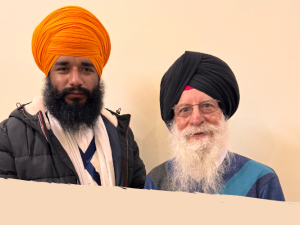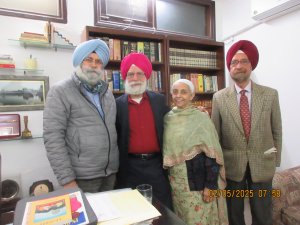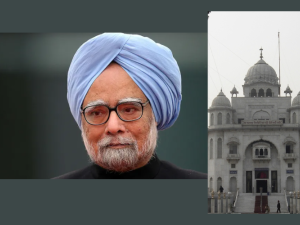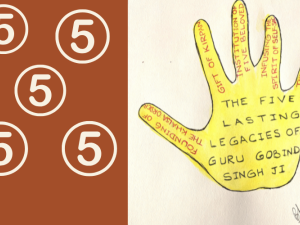There is a line in Guru Granth Sahib by Guru Arjan Dev Ji:
"grIbI gdw hmwrI ]"
"Gareebee gadhaa hamaaree." (SGGS, Pg. No. 628)
Meaning: Humility is my spiked club.
 A spiked club was a weapon in those days. With humility as the weapon of choice Guru Ji fought, charmed and disarmed his opponents. From history it is quite clear that Guru Ji faced more than a proportional share of opponents, with his staunchest opponent being his eldest brother. From where did Guru Ji acquire this virtue that became his character trait and working style? When we trace it backwards through the historical facts, we find that humility was bestowed upon Guru Nanak Dev Ji by the Almighty. From Guru Nanak Dev Ji this virtue was passed on all the subsequent Gurus as a legacy. First let us see the record of Bhai Gurdaas Ji about this fact:
A spiked club was a weapon in those days. With humility as the weapon of choice Guru Ji fought, charmed and disarmed his opponents. From history it is quite clear that Guru Ji faced more than a proportional share of opponents, with his staunchest opponent being his eldest brother. From where did Guru Ji acquire this virtue that became his character trait and working style? When we trace it backwards through the historical facts, we find that humility was bestowed upon Guru Nanak Dev Ji by the Almighty. From Guru Nanak Dev Ji this virtue was passed on all the subsequent Gurus as a legacy. First let us see the record of Bhai Gurdaas Ji about this fact:
"bwbw pYDw sc KMif nau iniD nwmu grIbI pweI]"
"Baba paidhhaa sach khand nau nidh naam gareebee paaee." (Bhai Gurdaas Vaar # 1)
Meaning: Baba reached the region of Truth, wherefrom he received Naam, the storehouse of nine treasures and humility.
So, it is authenticated that Guru Ji received the treasure of Naam and humility. But has Guru Nanak Dev Ji also commented on this subject? We can check it from Guru Granth Sahib. Guru Ji says:
"imTqu nIvI nwnkw gux cMigAweIAw qqu ]"
"Mithath neevee naanakaa gun changiaaeeaa tat." (SGGS, Pg. No. 470)
Meaning: Sweetness of humility, O Nanak, is the (true) essence of all virtues.
Now, let us try to look for a glimpse of humility in the life of Guru Nanak Dev Ji. When Bhai Lehna was leading the party of pilgrims from his village Khadur to Jwalamukhi, on their way they had camped at the outskirts of Kartarpur. He decided to utilize the opportunity to visit with Guru Nanak Dev Ji. That evening, leaving his pilgrims party behind, he proceeded towards Kartarpur. On his way he met a tall, strong and cheerful man, whom he asked for directions to Nanak Tapa's place. The old man gently replied; "You can come with me, I am going that way myself." Bhai Lehna was relieved that the search for Guru Nanak Dev Ji was coming to an end. Bhai Lehna started following the old man on his horse. On reaching the house, the old man asked Bhai Lehna to tie his horse to the peg, freshen up and go inside to visit Guru Nanak Dev Ji. The old man fed and watered Lehna’s horse. Bhai Lehna freshened up, then walked into the house and was shocked to see same old person seated there. He was embarrassed that he did not show courtesy, as he was riding the horse the person he came to visit was walking the entire distance. Bhai Lehna apologized and Guru Nanak Dev Ji comforted him, assuring him that he had done nothing wrong. Guru Ji also added that it was the host's duty to serve the guest. This incident shows the life of humility that Guru Ji lived. After visiting with Guru Ji, Bhai Lehna was a transformed man, the desire to visit Jwalamukhi had vanished and he decided to spend the night there so that he could attend the morning satsang.
Bhai Lehna decided to become a disciple of Guru Ji. He went back to the camp and informed his group that he would not be going, so they all proceeded without their leader. Lehna served Guru Ji well, becoming his personal attendant and in the process of doing so he was transformed. Bhai Lehna won the heart of Guru by his humility. Guru Nanak Dev Ji named him Angad, meaning "part of me" and installed him as his successor. Before being appointed as the successor, Bhai Lehna had been through many tests where he showed extreme humility in all situations. In fact, Bhai Lehna won the heart of Guru Ji with his exemplary humility.
Now let us look at how Guru Angad Dev Ji exercised this inherited virtue of humility in his life.
 After bestowing guruship, Guru Nanak Dev Ji asked Guru Angad Dev Ji to move to Khadur, away from the jealousy of his sons who were not chosen as his successor. One time there was a severe drought in Khadur and crops and animals were dying. The villagers approached Tapa Shiv Nath for advice. The Tapa told the villagers that the Rain God was angry, as a householder claiming to be the Guru was living in Khadur and the villagers were holding him up in reverence. Under the influence of his instigation, the villagers pleaded with Guru Ji to bring rain; failing which he should leave the village. Guru Ji replied that only God can bring rain. Upon hearing this, the villagers asked Guru Ji to leave the village as the Tapa had promised that he could bring the rain to the drought hit village within 24 hours. Guru Ji did not retaliate either against the villagers or the Tapa, but quietly left the village on his own accord. The story continues how the Tapa also failed to bring any rain and how he ended up losing his life at the hand of villagers. But, the point we are concerned with is humility and how Guru Angad Dev Ji proved to be an epitome of humility despite the conspiracy of the Tapa. Guru Ji did not admonish him or challenge him but displayed extreme humility under a provoking scenario. There is eyewitness evidence from Guru Granth Sahib in the words of Balwand, that this trait was passed on to him:
After bestowing guruship, Guru Nanak Dev Ji asked Guru Angad Dev Ji to move to Khadur, away from the jealousy of his sons who were not chosen as his successor. One time there was a severe drought in Khadur and crops and animals were dying. The villagers approached Tapa Shiv Nath for advice. The Tapa told the villagers that the Rain God was angry, as a householder claiming to be the Guru was living in Khadur and the villagers were holding him up in reverence. Under the influence of his instigation, the villagers pleaded with Guru Ji to bring rain; failing which he should leave the village. Guru Ji replied that only God can bring rain. Upon hearing this, the villagers asked Guru Ji to leave the village as the Tapa had promised that he could bring the rain to the drought hit village within 24 hours. Guru Ji did not retaliate either against the villagers or the Tapa, but quietly left the village on his own accord. The story continues how the Tapa also failed to bring any rain and how he ended up losing his life at the hand of villagers. But, the point we are concerned with is humility and how Guru Angad Dev Ji proved to be an epitome of humility despite the conspiracy of the Tapa. Guru Ji did not admonish him or challenge him but displayed extreme humility under a provoking scenario. There is eyewitness evidence from Guru Granth Sahib in the words of Balwand, that this trait was passed on to him:
"joiq Ehw jugiq swie sih kwieAw Pyir pltIAY ]"
"Jo? ohha juga? saae saeh kaaiya fer palteeai." (SGGS, Pg. No. 966)
Meaning: They shared the One Light and the same way; the King just changed His body.
Let's look briefly and see how the other Gurus also displayed extreme humility even under provocative situations. This is the legacy that was carried out by each of the subsequent Gurus.
The third Guru, Amar Das Ji, was kicked in the back by Dattu Ji son of Guru Angad Dev Ji as he felt deprived of the Guruship, which he considered as his heritage and birthright. Guru Amar Das Ji was sitting on his seat and he fell down because of the blow that he received. Instead of worrying about himself he started inquiring about the welfare of Dattu Ji and started massaging his feet. He even apologized and said; "My hard bones might have hurt your tender feet". Dattu Ji occupied the seat and proclaimed himself as the Guru. Guru Amar Das Ji just walked out and left the village. His claim to the Guruship was not accepted by the Sikhs, so he decided to beat a hasty retreat back to Khadur from Govindwal.
The fourth Guru, Ram Das Ji, was the son-in-law of Guru Amar Das Ji and he had completely dedicated himself to the service of Guru Amar Das Ji. His family members came to visit Guru Ji in Baserke on their way back to Lahore from their visit to Ganga. They were shocked to see their brethren, a son-in-law, was working like a labourer in the construction of the water pond. Hearing the taunts of his relatives Ram Das Ji asked for forgiveness from Guru Amar Das Ji, saying that they did not understand that sewa was above caste, creed and relationship. This took place before Guru Ram Das Ji became Guru. Now, let us look at another incident after he became the Guru.
Baba Sri Chand was the older son of Guru Nanak Dev Ji, who had devoted himself to yoga and became the leader of the Udassis. He decided to visit Guru Ram Das at Goindwal. Upon learning the news of Baba Sri Chand's arrival, Guru Ji came out to greet and to welcome him. Guru Ji made an offering of a strong beautiful horse and Five Hundred Rupees. As a yogi, Baba Sri Chand Ji remained youthful throughout his life, always looking about 16 years old through he lived to be over 100. On seeing Guru Ji he asked him "Why is your beard so long?" Guru Ji replied in all humility; "Oh Holy Sir! This beard is long to wipe the feet of holy men like you." Saying this, Guru Ji started wiping the feet of Baba Sri Chand with his beard.
The fifth Guru Arjan Dev Ji's wife Mata Ganga, once asked him; "You grant everyone’s wishes, please grant just one wish of mine." Guru Ji in an act of humility decided that let Baba Budha Ji be the conduit for granting the wish. He said to her that God grants the wishes of His dear ones, so she should go and ask Baba Budha Ji. Mata Ji decided to act on the advice. Next day, she got food prepared and offerings readied. Along with an entourage of female attendants she departed on a decorated bullock cart. On reaching Baba Ji’s place she placed the offerings in front of Baba Ji and expressed her purpose. Baba Budha Ji replied; "O Mother! I am only a grass cutter. I am a slave of slaves and devoid of any power to grant wishes". Mata Ji returned back home very dejected and related the episode to Guru Ji. Guru Ji consoled Mata Ji, and advised her on the proper technique to approach the saints. Next day Mata Ji acting on the advice prepared a hearty meal from scratch with her own hands. She was sure to include some raw onions as she knew Baba Ji was very fond of onions. She carefully wrapped the meal, placed it on her head and journeyed alone by foot without any of her retinue.
Baba Budha Ji saw her coming and he welcomed her and said that the mother knows when a child is hungry for food. He joyfully accepted the offering and blessed Mata Ji in these words; "O Mother! Your son will be Master of Masters. He will break the power of the Mughals as I break these onions under my fist." This is how Guru Ji not only displayed extreme humility but also set an example for all of us. In Part II, we shall look for episodes of humility from the lives of the other five Gurus.
References:
1. Gupta, Shabnam. Life and Teachings of Guru Angad Dev.
2. Talwara, Joginder Singh. Guru Angad Deeo Nidhan
3. www.Sikh-history.com
4. Sikh Missionary Center. Detroit, MI. Sikh Religion
5. Jagdev, Santokh Singh. Bed Time Stories - 5.
6. Singh, Kartar & Dhillon Gurdial singh. Stories from Sikh History, Book II.
7. Singh, Puran. The Ten Masters.
---------------------------------
Related Article by the same author:http://www.sikhnet.com/news/steve-jobs-and-thoughts-death






